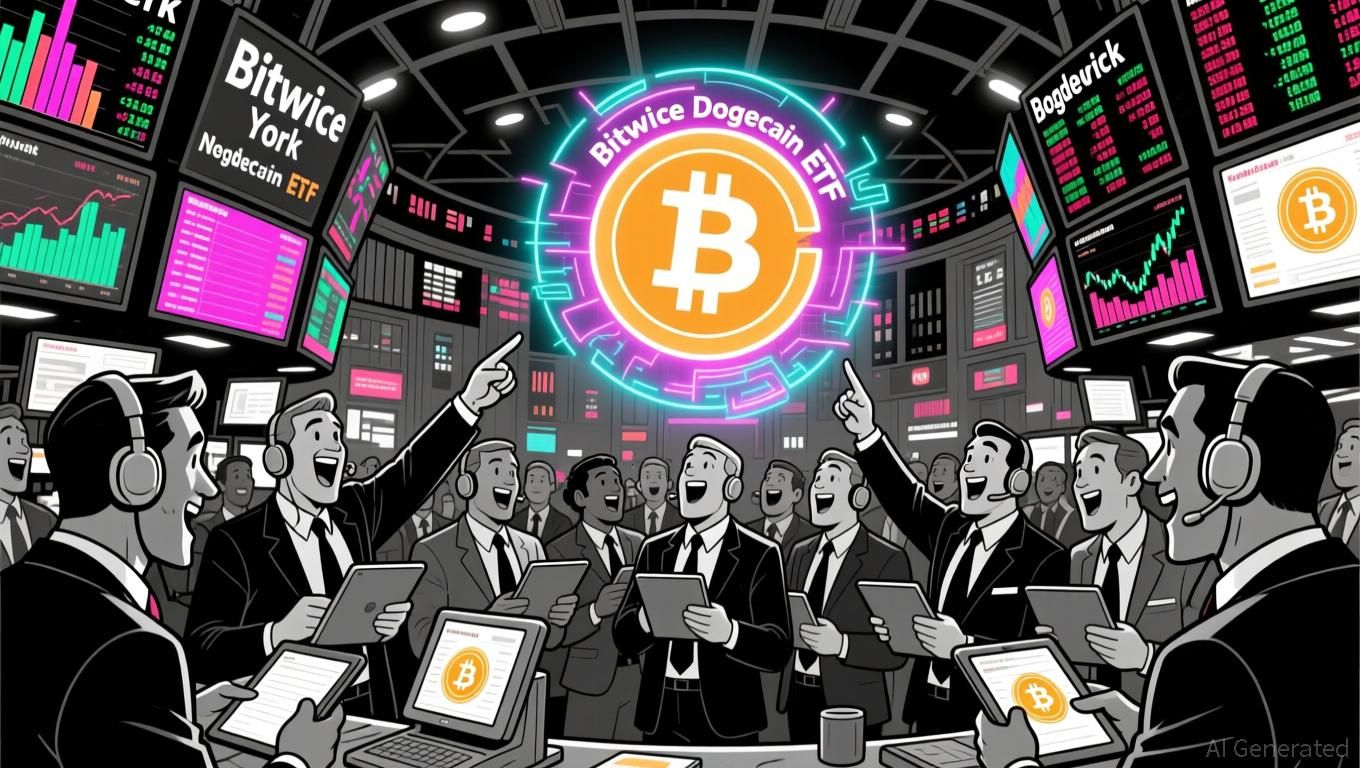Tech’s Balancing Act: Navigating Privacy Advances and International Regulations
- Worldcoin's AMPC protocol sparks interest in blockchain privacy and compliance, reflecting global tech's balancing act between innovation and regulation. - Australia's $14.52B BNPL market and KuCoin's AUSTRAC registration highlight financial innovation's increasing regulatory scrutiny and compliance demands. - DeFi projects like Mutuum Finance ($18.9M raised) and Blazpay prioritize security audits and multichain solutions to address scalability and transparency challenges. - Apple's ATT policy faces EU a
Emerging Trends in Blockchain, Finance, and Regulatory Oversight
The unveiling of Worldcoin's AMPC protocol, designed to bolster privacy, has reignited discussions about how blockchain advancements can coexist with regulatory demands. This renewed focus is part of a larger movement within the digital asset sector, where the challenge lies in safeguarding user privacy while ensuring compliance with oversight bodies. This balancing act is visible across various domains, from crypto exchanges adapting to new regulations to DeFi projects emphasizing rigorous security evaluations.
Regulatory Shifts in Financial Innovation
Australia's Buy Now Pay Later (BNPL) industry is anticipated to reach a value of $14.52 billion by 2025, highlighting how innovative financial products are increasingly coming under regulatory examination. The Australian Securities and Investments Commission (ASIC) has introduced licensing requirements that are reshaping lending practices, echoing the compliance hurdles faced by the cryptocurrency sector. In a similar vein, KuCoin's recent registration with AUSTRAC marks a pivotal moment for global crypto exchanges striving to meet Australia's strict regulatory expectations. By collaborating with Echuca Trading, a licensed financial services partner, KuCoin has strengthened its fiat gateway, addressing issues of transparency and user safety.

DeFi Innovations and Security Priorities
Within decentralized finance, platforms like Mutuum Finance (MUTM) are emphasizing both robust security and scalability. Mutuum’s automated lending and borrowing system aspires to combine the reliability of traditional finance with the openness of blockchain technology. At the same time, Blazpay’s token initiatives are introducing solutions for multichain settlements and AI-powered development tools. These innovations are designed to bridge gaps between different blockchains and boost user participation through gamified incentives.
Privacy, Competition, and Regulatory Scrutiny
Regulatory challenges extend beyond the crypto world. Apple’s App Tracking Transparency (ATT) feature is currently under investigation by Poland’s competition authority, UOKiK, which contends that ATT could give Apple an unfair advantage by limiting third-party data collection and potentially breaching competition laws. This inquiry is part of a wider European probe and could result in significant penalties, underscoring the ongoing struggle to balance privacy protections with fair competition in the digital marketplace.
AI-Driven Advancements in Healthcare and Crypto Mining
Artificial intelligence is also making significant inroads in healthcare. Profound Medical’s TULSA-AI Volume Reduction module, developed for treating benign prostatic hyperplasia (BPH), utilizes machine learning to enhance the efficiency of prostate ablation procedures. This technology aims to reduce surgery times and preserve patient outcomes, broadening access to less invasive treatments. Similarly, in the cryptocurrency sector, companies like CleanSpark are focusing on optimizing energy use and operational flexibility in their Bitcoin mining operations to sustain profitability, as highlighted in recent financial disclosures.
The Road Ahead: Responsible Innovation
Across these diverse sectors, a common theme is emerging: the pursuit of responsible innovation. Whether it’s navigating compliance in crypto, integrating AI into medical procedures, or adapting to new financial regulations, industry leaders are contending with the dual imperatives of technological advancement and ethical responsibility. The organizations that can successfully harmonize these priorities are poised to shape the future of their industries.
Disclaimer: The content of this article solely reflects the author's opinion and does not represent the platform in any capacity. This article is not intended to serve as a reference for making investment decisions.
You may also like
DOGE Rises 5.3% Over the Past Week as Bitwise Introduces Dogecoin ETF
- Bitwise launched a Dogecoin ETF (BWOW) on NYSE, boosting institutional/retail access to DOGE via regulated ETP format. - DOGE rose 5.3% in 7 days post-listing but remains down 51.68% year-to-date amid broader bearish trends. - Growing institutional adoption of altcoins is accelerating, with similar ETPs emerging in Europe and Zcash ETF filings in the U.S. - The ETF's success could drive sustained inflows, testing key resistance levels and potentially reversing DOGE's long-term decline.

BTC Price Rises 0.37% as Goodfood Announces BTC Assets and Shows Market Strength
- Goodfood Market Corp. disclosed $3.4M in BTC ETF holdings amid $25M Q4 sales and $4M net loss. - BTC rose 0.37% in 24 hours to $91,684 but fell 16.36% monthly amid institutional adoption trends. - Company shifted to Heat & Eat meals and cost controls to boost margins amid inflation and labor pressures. - Strategic BTC allocation reflects growing corporate interest in crypto diversification despite market volatility. - Persistent cost challenges and meal-kit market contraction force 2026 profitability-foc

XLM Gains 2.31% as Advancements in Institutional Staking and AI Adoption Indicate Promising Long-Term Expansion
- XLM rose 2.31% in 24 hours amid short-term stabilization despite 14.23% monthly and 21.37% annual declines. - Lumint's AI-powered hybrid node staking model automates operations across blockchains, enhancing accessibility for institutional and retail users. - Ethereum's gas limit increase to 60M reflects AI-driven scaling trends, indirectly supporting XLM's position as a low-cost cross-border payment solution. - Institutional adoption of AI integration and infrastructure innovations, including OKX partner

SHIB Climbs 2.28% as Worldwide Crypto Tax Implementation Postponed
- SHIB rises 2.28% amid 14.14% weekly gain but faces 57.7% annual decline amid evolving crypto regulations. - Switzerland delays CARF enforcement to 2027 to align global tax reporting standards and ease domestic crypto compliance. - 75 nations including Switzerland commit to CARF implementation, but major economies like India and Vietnam remain uncommitted. - Regulatory delays create market uncertainty as investors balance compliance risks with crypto tax policy shifts globally.
